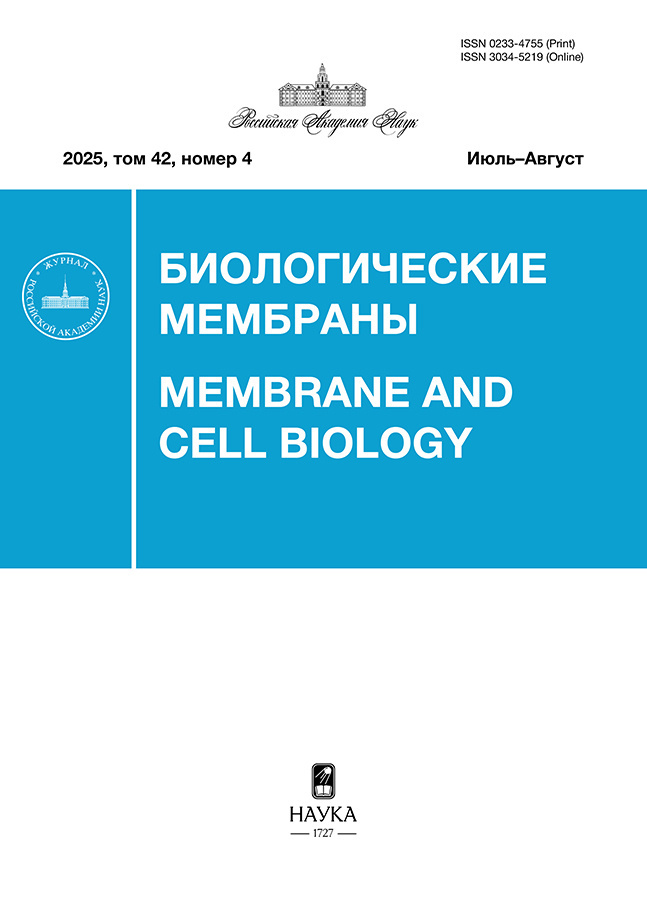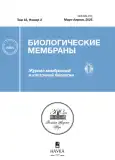Line Tension of Pore Edge in Membrane on Solid Support
- Authors: Kostina D.I.1, Sumarokova M.V.2, Dudik S.P.2, Bashkirov P.V.2, Akimov S.A.1
-
Affiliations:
- National University of Science and Technology “MISiS”
- Research Institute of System Biology and Medicine of Rospotrebnadzor
- Issue: Vol 42, No 2 (2025)
- Pages: 130-141
- Section: Articles
- URL: https://gynecology.orscience.ru/0233-4755/article/view/680871
- DOI: https://doi.org/10.31857/S0233475525020049
- EDN: https://elibrary.ru/UFROTW
- ID: 680871
Cite item
Abstract
Controlled formation of through pores in bilayer lipid membranes is a key stage of various biotechnological techniques. Excess energy of the pore edge is characterized by line tension, the value of which determines the overall stability of the membrane with respect to pore formation. The practically important pore size is on the order of a few nanometers. It is impossible to study such pores by direct optical methods, but they can, in principle, be visualized by atomic force microscopy. This method uses a solid support on which the lipid bilayer is held due to the interaction of one of the monolayers with it. In this work, we theoretically investigated the effect of the presence of the support on the value of the line tension of the pore edge. It was assumed that the line tension is determined by the energy of elastic deformations of the membrane at the edge. Various regimes of membrane interaction with the support were considered: from a free-standing membrane (complete absence of interaction) to the case of infinitely strong adhesion of the membrane to the support. The calculation results show that the relative change in the line tension of the pore edge within such variation of the intensity of the interaction of the membrane with the support is less than 3.5%. Thus, the developed theoretical model predicts an extremely weak effect of the interaction with the support on the magnitude of the line tension–the main energy characteristic of the pore edge.
Full Text
About the authors
D. I. Kostina
National University of Science and Technology “MISiS”
Email: akimov@misis.ru
Russian Federation, Moscow, 119049
M. V. Sumarokova
Research Institute of System Biology and Medicine of Rospotrebnadzor
Email: akimov@misis.ru
Russian Federation, Moscow, 117246
S. P. Dudik
Research Institute of System Biology and Medicine of Rospotrebnadzor
Email: akimov@misis.ru
Russian Federation, Moscow, 117246
P. V. Bashkirov
Research Institute of System Biology and Medicine of Rospotrebnadzor
Email: akimov@misis.ru
Russian Federation, Moscow, 117246
S. A. Akimov
National University of Science and Technology “MISiS”
Author for correspondence.
Email: akimov@misis.ru
Russian Federation, Moscow, 119049
References
- Olbrich K., Rawicz W., Needham D., Evans E. 2000. Water permeability and mechanical strength of polyunsaturated lipid bilayers. Biophys. J. 79, 321–327.
- Zhang X.C., Li H. 2019. Interplay between the electrostatic membrane potential and conformational changes in membrane proteins. Protein Sci. 28, 502–512.
- Vacher H., Trimmer J.S. 2011. Diverse roles for auxiliary subunits in phosphorylation-dependent regulation of mammalian brain voltage-gated potassium channels. Eur. J. Physiol. 462, 631–643.
- Caplan M.J. 2001. Ion pump sorting in polarized renal epithelial cells. Kidney Int. 60, 427–430.
- Südhof T.C., Rothman J.E. 2009. Membrane fusion: Grappling with SNARE and SM proteins. Science. 323, 474–477.
- Antonny B., Burd C., De Camilli P., Chen E., Daumke O., Faelber K., Ford M., Frolov V.A., Frost A., Hinshaw J.E., Kirchhausen T., Kozlov M.M., Lenz M., Low H.H., McMahon H., Merrifield C., Pollard T.D., Robinson P.J., Roux A., Schmid S. 2016. Membrane fission by dynamin: What we know and what we need to know. EMBO J. 35, 2270–2284.
- Дунина-Барковская А.Я., Вишнякова Х.С., Баратова Л.А., Радюхин В.А. 2019. Модуляция холестерин-зависимой активности макрофагов IC-21 пептидом, содержащим два CRAC-мотива из белка M1 вируса гриппа. Биол. мембраны 36, 271–280.
- Pérez-Peinado C., Dias S.A., Domingues M.M., Benfield A.H., Freire J.M., Rádis-Baptista G., Gaspar D., Castanho M.A.R.B., Craik D.J., Henriques S.T., Veiga A.S., Andreu D. 2018. Mechanisms of bacterial membrane permeabilization by crotalicidin (Ctn) and its fragment Ctn (15–34), antimicrobial peptides from rattlesnake venom. J. Biol. Chem. 293, 1536–1549.
- Дерягин Б.В., Гутоп Ю.В. 1962. Теория разрушения (прорыва) свободных пленок. Коллоидн. журн. 24, 431–437.
- Evans E., Heinrich V., Ludwig F., Rawicz W. 2003. Dynamic tension spectroscopy and strength of biomembranes. Biophys. J. 85, 2342–2350.
- Evans E., Smith B.A. 2011. Kinetics of hole nucleation in biomembrane rupture. New J. Phys. 13, 095010.
- Karal M.A.S., Levadnyy V., Yamazaki M. 2016. Analysis of constant tension-induced rupture of lipid membranes using activation energy. Phys. Chem. Chem. Phys. 18, 13487–13495.
- Portet T., Dimova R. 2010. A new method for measuring edge tensions and stability of lipid bilayers: Effect of membrane composition. Biophys. J. 99, 3264–3273.
- Karatekin E., Sandre O., Guitouni H., Borghi N., Puech P.H., Brochard-Wyart F. 2003. Cascades of transient pores in giant vesicles: Line tension and transport. Biophys. J. 84, 1734–1749.
- Панов П.В., Акимов С.А., Батищев О.В. 2014. Изопреноидные цепи липидов повышают устойчивость мембран к формированию сквозных пор. Биол. мембраны 31, 331–335.
- Ilton M., DiMaria C., Dalnoki-Veress K. 2016. Direct measurement of the critical pore size in a model membrane. Phys. Rev. Lett. 117, 257801.
- Parvez F., Alam J.M., Dohra H., Yamazaki M. 2018. Elementary processes of antimicrobial peptide PGLa-induced pore formation in lipid bilayers. Biochim. Biophys. Acta. 1860, 2262–2271.
- Galimzyanov T.R., Bashkirov P.V., Blank P.S., Zimmerberg J., Batishchev O.V., Akimov S.A. 2020. Monolayerwise application of linear elasticity theory well describes strongly deformed lipid membranes and the effect of solvent. Soft Matter 16, 1179–1189.
- Garcia-Manyes S., Oncins G., Sanz F. 2005. Effect of temperature on the nanomechanics of lipid bilayers studied by force spectroscopy. Biophys. J. 89, 4261–4274.
- Goksu E.I., Vanegas J.M., Blanchette C.D., Lin W.C., Longo M.L. 2009. AFM for structure and dynamics of biomembranes. Biochim. Biophys. Acta. 1788, 254–266.
- Batishchev O.V., Shilova L.A., Kachala M.V., Tashkin V.Y., Sokolov V.S., Fedorova N.V., Baratova L.A., Knyazev D.G., Zimmerberg J., Chizmadzhev Y.A. 2016. pH-dependent formation and disintegration of the influenza A virus protein scaffold to provide tension for membrane fusion. J. Virol. 90, 575–585.
- Галимзянов Т.Р., Акимов С.А. 2021. Конфигурации границы упорядоченного домена в липидной мембране на твердой подложке. Биол. мембраны 38, 257–267.
- Kondrashov O.V., Akimov S.A. 2022. Effect of solid support and membrane tension on adsorption and lateral interaction of amphipathic peptides. J. Chem. Phys. 157, 074902.
- Akimov S.A., Volynsky P.E., Galimzyanov T.R., Kuzmin P.I., Pavlov K.V., Batishchev O.V. 2017. Pore formation in lipid membrane II: Energy landscape under external stress. Sci. Rep. 7, 12509.
- Hamm M., Kozlov M.M. 2000. Elastic energy of tilt and bending of fluid membranes. Eur. Phys. J. E. 3, 323–335.
- Kondrashov O.V., Galimzyanov T.R., Pavlov K.V., Kotova E.A., Antonenko Y.N., Akimov S.A. 2018. Membrane elastic deformations modulate gramicidin A transbilayer dimerization and lateral clustering. Biophys. J. 115, 478–493.
- Leikin S., Kozlov M.M., Fuller N.L., Rand R.P. 1996. Measured effects of diacylglycerol on structural and elastic properties of phospholipid membranes. Biophys. J. 71, 2623–2632.
- Rawicz W., Olbrich K.C., McIntosh T., Needham D., Evans E.A. 2000. Effect of chain length and unsaturation on elasticity of lipid bilayers. Biophys. J. 79, 328–339.
- Hamm M., Kozlov M.M. 1998. Tilt model of inverted amphiphilic mesophases. Eur. Phys. J. B. 6, 519–528.
- Nagle J.F., Wilkinson D.A. 1978. Lecithin bilayers. Density measurement and molecular interactions. Biophys. J. 23, 159–175.
- Müller D.J., Fotiadis D., Scheuring S., Müller S.A., Engel A. 1999. Electrostatically balanced subnanometer imaging of biological specimens by atomic force microscope. Biophys. J. 76, 1101–1111.
- LeNeveu D.M., Rand R.P., Parsegian V.A. 1976. Measurement of forces between lecithin bilayers. Nature 259, 601–603.
- Lipowsky R., Sackmann E. 1995. Handbook of biological physics. Chapter 11. Generic interactions of flexible membranes. Amsterdam: Elsevier Sci., p. 521–602.
- Kollmitzer B., Heftberger P., Rappolt M., Pabst G. 2013. Monolayer spontaneous curvature of raft-forming membrane lipids. Soft Matter 9, 10877–10884.
Supplementary files











